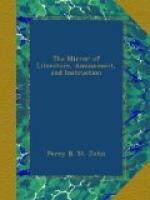Descartes observes, that the soul is so much influenced by the constitution of our bodily organs, that if it were possible to find out a method of increasing our penetration, it should certainly be sought for in medicine, the connexion between the body and mind, is, in fact, so strong, that it is difficult to conceive how one of them should act, and the other not be sensible, in a greater or less degree, of that action. The organs of sense, by which we acquire all our ideas of external objects, when acted upon, convey the subject of thought to the nervous fibres of the brain; and while the mind is employed in thinking, the part of the brain is in a greater or less degree of motion; a large quantity of blood is transmitted to the brain, the action of the arteries become increased, and the nervous system sensibly affected.
Plato has remarked, with reference to the influence of the mind on the corporeal frame, “Where the action of the soul is too powerful, it attacks the body so powerfully that it throws it into a consuming state; if the soul exerts itself in a peculiar manner on certain occasions, the body is made sensible of it, for it becomes heated and debilitated.” An Italian physician also observes on this subject, that the union of the soul with the body is so intimate, that they reciprocally share the good or evil which happens to either of them. The mind cannot put forth its powers when the body is tired with inordinate exercise and too close application to study destroys the body by dissipating the animal spirits which are necessary to recruit it.[2]
The knowledge of the influence of the passions of the mind over the bodily functions, is of ancient date. Plato, in his “Timaeus,” states it as his firm conviction, that the spirit exerted a marked influence in producing disease. This opinion was afterwards revived by Helmont, Hesper Doloeus, and Stahl; the latter plainly says, that the rational soul presides over and directs the animal functions. In this doctrine he was followed by Nichols, in his “Anima Medica.” According to the doctrines of Stahl, the disorders of the body proceed principally from the mind; and, according as it is variously affected, it produces different effects (diseases.) Hence, when the mind, which animates the most robust and best organized body, is violently agitated by fright, rage, grief, vehement desire, or any other passion, whether sudden, or attended by long and painful sensations, the body manifestly suffers, and a variety of diseases, as apoplexy, palsy, madness, fever, and hysterics, may be the consequence. If this be true, an attention to the regulations of the mind is of much more importance than physicians seem disposed to admit. The poet of health justly says,
“’Tis the great art of life
to manage well
The restless mind.”




